A Comprehensive Guide to Social Learning Theory
Gyrus
FEBRUARY 8, 2023
Learn the fundamentals of social learning theory, criticisms, and social work applications. Click to learn more! Find out how it can help your enterprise.
This site uses cookies to improve your experience. By viewing our content, you are accepting the use of cookies. To help us insure we adhere to various privacy regulations, please select your country/region of residence. If you do not select a country we will assume you are from the United States. View our privacy policy and terms of use.

Gyrus
FEBRUARY 8, 2023
Learn the fundamentals of social learning theory, criticisms, and social work applications. Click to learn more! Find out how it can help your enterprise.

Lambda Solutions
SEPTEMBER 19, 2023
n the ever-evolving landscape of education, one theory stands out for its enduring relevance and transformative potential: Social Learning Theory. Coined by psychologist Albert Bandura in the 1960s, this theory has not only withstood the test of time but has also gained renewed importance in the digital age.
This site is protected by reCAPTCHA and the Google Privacy Policy and Terms of Service apply.

LearnDash
FEBRUARY 2, 2021
Or do we just learn through raw mental power? During the twentieth century, four major learning theories emerged, and each has lessons that online educators can learn from to design better courses. Behaviorism: Learning is a product of stimulus and reinforcement. Let’s look at what they are.
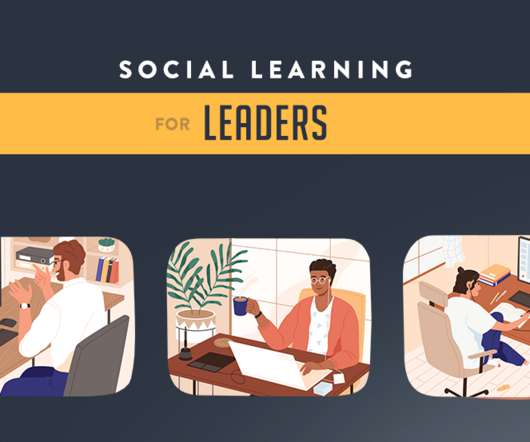
Dashe & Thomson
NOVEMBER 18, 2022
Learning and Development: Social Learning for Leaders. For leaders, social learning is?an Social learning requires constant awareness of your surroundings and your responses to the actions of yourself and others around you. Leadership and Social Learning Theories.

isEazy
NOVEMBER 10, 2023
Albert Bandura’s social learning theory is a perspective that has left a deep impression on the field of psychology and education. In the business […]

Dashe & Thomson
FEBRUARY 23, 2011
Social Learning Blog Training and Performance Improvement in the Real World Home About Bios Subscribe to RSS The Impact of Social Learning: Will You Be The First? by Andrea on February 23, 2011 in social learning The other night I attended a lecture at the University of Minnesota Medical School.

Kapp Notes
MAY 23, 2011
Here are some thoughts and ideas related to Albert Bandura’s social learning theory. Bandura’s social learning theory indicates the effectiveness of human social models in influencing another to change behaviors, beliefs or attitudes, as well as social and cognitive functioning.

Dashe & Thomson
JANUARY 27, 2011
Social Learning Blog Training and Performance Improvement in the Real World Home About Bios Subscribe to RSS Online Video: the Perfect Social Learning Tool? Because video is, apparently, a perfect manifestation of social learning theory. I think social learning must be informal and fun.
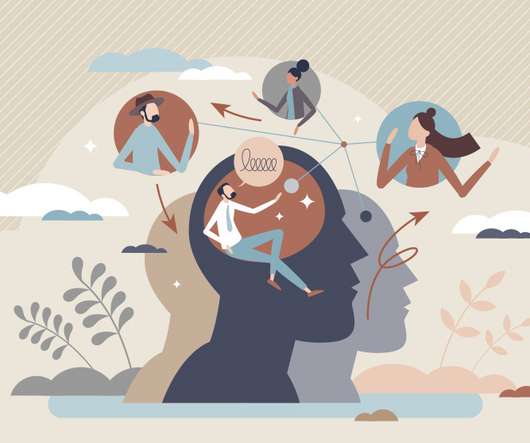
PulseLearning
FEBRUARY 28, 2022
Have you recently looked at Bandura’s Social Learning Theory principles? We are social creatures by nature. In fact, unless you’re a Himalayan yogi, long-term social isolation can have negative mental impacts. It’s no surprise that social interaction plays a role in learning. Observational learning.

eLearning Industry
MAY 1, 2023
This is highlighted in the connectivism learning theory, which focuses on collaborative learning and social and cultural factors. How can the theory be applied in eLearning? Technology plays an important role in the way we receive and share information. What are its advantages?

Dashe & Thomson
MAY 4, 2011
Cammy Bean’s latest blog post provides many ideas as well as real-life examples for Using Social Media for Learning. The slow adoption of social learning is not localized to Minnesota and North Carolina. Every day, social media and informal learning entrench themselves more into the fabric of our everyday lives.

Lambda Solutions
MARCH 6, 2019
How to turn social learning theory into a useful resource.

Dashe & Thomson
MAY 11, 2011
A lot of the Social Media Mavens , however, are really ranting, not about the technology, but about the human dynamics related to social networking. They’re sources of novelty and innovation (because they know quite different things than we do) and bridges to other social networks (because they know quite different people than we do).

Dashe & Thomson
APRIL 19, 2011
Social Learning Blog Training and Performance Improvement in the Real World Home About Bios Subscribe to RSS Who’s Building the Social Learning Roads? Last week I participated in a webinar entitled The State of Social Media Marketing Industry , co-hosted by Hubspot and Social Media Examiner.
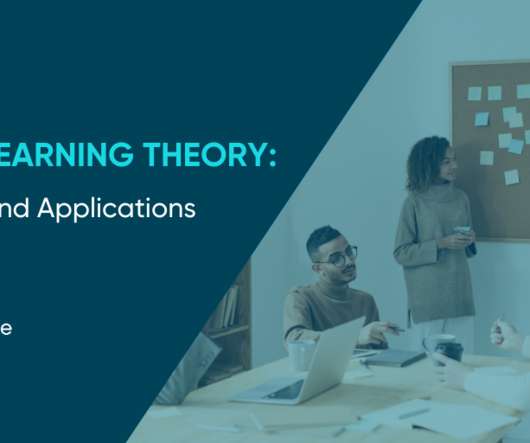
Roundtable Learning
FEBRUARY 11, 2020
In this blog, we explore how understanding and applying the Social Learning Theory can boost Learning & Development and training courses. We learn and develop from the people we surround ourselves with. Albert Bandura, a social psychologist, developed a theory surrounding this type of collaborative learning.

Kapp Notes
MAY 27, 2011
Recently, I posted about Bandura’s Social learning theory , this posting continues the discussion and relates it specifically to instruction involving avatars. Social Learning Theory. Therefore, the use of avatars for presenting the proper model of behavior does transfer learning.

TalentLMS
JUNE 16, 2022
There are a number of different adult learning theories that can be used to guide employee training, each with its own advantages and disadvantages. In order to choose the best approach for your business, it is important to understand the key concepts of each theory. Theories of learning for employee training.
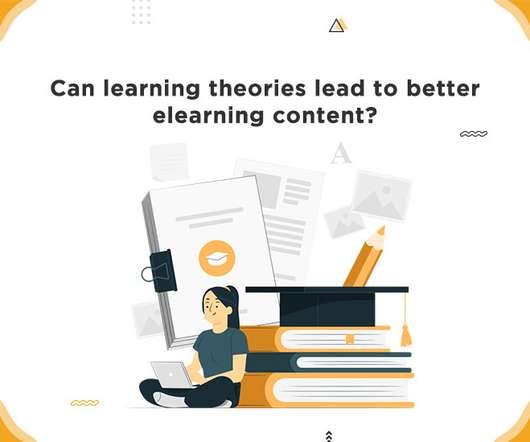
Creativ Technologies
MARCH 24, 2022
The learning theories can take your e-learning content in a new direction because they can improve its comprehension. So, many learning theories can ensure that learners take a lot of interest in the content. Learning theories are needed because employees like to grasp information differently.

Docebo
JULY 8, 2021
Social learning can help today’s organizations keep up with the pace at which their business moves. More and more, organizations are turning to social learning to deliver exciting e- learning experiences to their customers, partners, and employees. What is social learning? Need proof?

Dashe & Thomson
MARCH 8, 2011
The gist of it was that even though we have an enormous amount of tools available to enable social learning across far reaching boundaries, the self-study type of eLearning seen in so many workplaces today can potentially cut learners off from any type of social interaction during the course of the learning.

Dashe & Thomson
FEBRUARY 10, 2011
Social Learning Blog Training and Performance Improvement in the Real World Home About Bios Subscribe to RSS Not Everyone is a Social Customer by Paul on February 11, 2011 in Development Tools , customer service , social learning A couple weeks ago I wrote a blog about the need to train your clients on the various methods of…training.
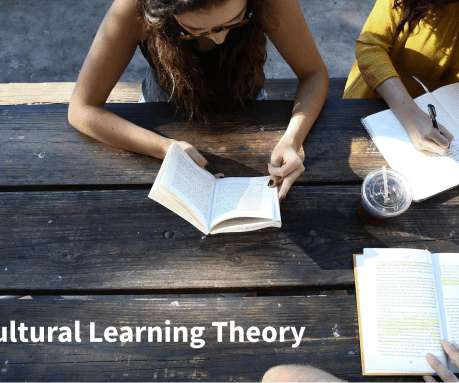
Ed App
NOVEMBER 10, 2021
The acquisition of knowledge is an individual undertaking, but the sociocultural learning theory argues that social interaction is vital in learning. What is sociocultural learning theory? Sign up for Free and Start Using The Best LMS To Help Redefine Learning. Language and Symbols.
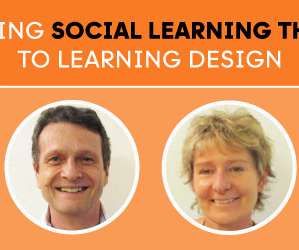
The eLearning Coach
MAY 13, 2021
I speak with Etienne and Beverly Wenger-Trayner about the big ideas in their book, Learning to Make a Difference. They share ways that we can live and learn intentionally in a social learning context. I speak with Etienne and Beverly Wenger-Trayner about the big ideas in their book, Learning to Make a Difference.

Dashe & Thomson
MARCH 25, 2011
Social Learning Blog Training and Performance Improvement in the Real World Home About Bios Subscribe to RSS The Return of the (Digital) Native by Jim on March 25, 2011 in mobile learning In recent years, we’ve all heard a lot about digital natives. Rob Mueller: Great post on using games as a training device. It is amazing ho.

GoSkills eLearning
AUGUST 4, 2020
Understand what the Social Learning Theory is, why it's important, and how to apply it to eLearning particularly when your employees are working remotely.

Dashe & Thomson
DECEMBER 14, 2010
Social Learning Blog Training and Performance Improvement in the Real World Home About Bios Subscribe to RSS Hey, That’s Social Learning! by Jolene on December 14, 2010 in social learning Recently I witnessed a fabulous and fascinating display of social learning – a high school chamber music concert.

Dashe & Thomson
AUGUST 30, 2018
Developmentally, both individually and as a culture, much of our learning has been social learning. Social learning theory is the concept of learning from other people through observation, questions, collaboration, and knowledge sharing.

Dashe & Thomson
APRIL 17, 2011
View all posts by Barbara → ← Brain Rules for Learning: Who Knew? Who’s Building the Social Learning Roads? I am an avid film goer, music lover, bridge walker, and supporter of the Dashe & Thomson running team. We All Did. Rob Mueller: Great post on using games as a training device. It is amazing ho.

Dashe & Thomson
MARCH 15, 2011
Organizations such as PACT, ASTD, MNISPI, and the Digital Learning Forum get my creative juices going to generate new ideas and synergies. I am an avid film goer, music lover, bridge walker, and supporter of the Dashe & Thomson running team. Rob Mueller: Great post on using games as a training device. Jim: Glad you enjoyed the post, Liam!

E-Learning Provocateur
JANUARY 12, 2010
Academia is teeming with learning theories. It can be quite a challenge for the modern learning professional to identify an appropriate learning theory, draw practical ideas from it, and apply it to their daily work. Which theory do you choose? How does it relate to other theories? Where do you start?

Dashe & Thomson
APRIL 6, 2011
Social Learning Blog Training and Performance Improvement in the Real World Home About Bios Subscribe to RSS The Sound of Silence by Jim on April 7, 2011 in eLearning At what point does narration really add anything to an eLearning module, and at what point is it simply being added because “it’s what’s expected?” It is amazing ho.
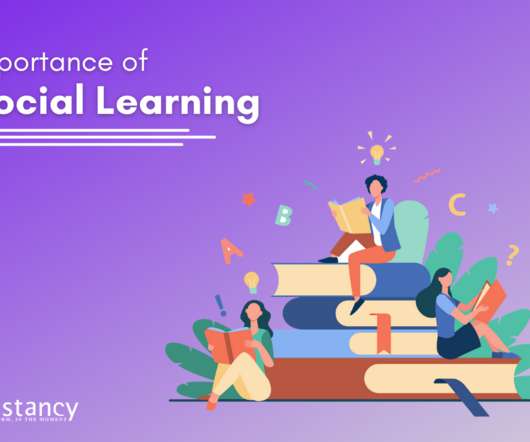
Instancy
MARCH 3, 2021
Social learning became the go-to workplace training approach during COVID-induced lockdowns. Read on to understand why you must adopt social learning as the way going forward in an age where managing remote teams is the new norm. Social Learning theory is no novelty. Not anymore!

Dashe & Thomson
APRIL 28, 2011
Social Learning Blog Training and Performance Improvement in the Real World Home About Bios Subscribe to RSS Social Media: The Virtual “Over-The-Partition” Learning Network by Jolene on April 28, 2011 in Informal Learning , Instructional Design , Training Development , Video , social learning According to the 1996 report from the U.S.

Dashe & Thomson
APRIL 21, 2011
View all posts by Andrea → ← Who’s Building the Social Learning Roads? In my free time, I enjoy reading, medical lectures, belly dancing and regular visits to my massage therapist. Rob Mueller: Great post on using games as a training device. Jim: Glad you enjoyed the post, Liam! It is amazing ho. Properly d.

Dashe & Thomson
APRIL 19, 2011
Social Learning Blog Training and Performance Improvement in the Real World Home About Bios Subscribe to RSS Who’s Building the Social Learning Roads? Last week I participated in a webinar entitled The State of Social Media Marketing Industry , co-hosted by Hubspot and Social Media Examiner.

Learning Everest
JANUARY 7, 2024
Social cognitive theory (SCT), primarily known as the social learning theory (SLT), was developed in the 1960s by Albert Bandura. The unique feature of [.]

Dashe & Thomson
DECEMBER 14, 2010
Social Learning Blog Training and Performance Improvement in the Real World Home About Bios Subscribe to RSS Hey, That’s Social Learning! by Jolene on December 14, 2010 in social learning Recently I witnessed a fabulous and fascinating display of social learning – a high school chamber music concert.

Dashe & Thomson
JANUARY 25, 2011
Even with the help of the newest technology tools to communicate and educate including social media, wikis, and Google, we still need to transform our ILT classrooms and training sessions into integrated blended learning environments. So how do you keep it real? Move from being a teacher to facilitator. Enjoy people; embrace life!

Experiencing eLearning
FEBRUARY 14, 2023
Through the simulated choices of social media messages and lots of immediate feedback and coaching, you learn to recognize tactics for manipulating information and influence online. PDF) Video game meets literature: language learning with Interactive Fiction. |

Dashe & Thomson
FEBRUARY 9, 2011
Military May 19, 2011 Give User Adoption the Respect it Deserves May 17, 2011 How Social Networks Can Harness the Power of Weak Ties May 11, 2011 Addressing On-Demand Learning and Performance Needs #LCBQ May 9, 2011 Why Companies Should Spend More on Social Learning May 5, 2011 Gregg Sean: Nice review of the topic , I was seeking to see wh.

Dashe & Thomson
MARCH 13, 2011
Social Learning Blog Training and Performance Improvement in the Real World Home About Bios Subscribe to RSS Twitter as Social Learning: Seven Ways to Facilitate the Exchange of Information by Paul on March 14, 2011 in social learning Most of us in the adult learning industry have already found and incorporated Twitter into our everyday lives.

Dashe & Thomson
MARCH 7, 2011
Social Learning Blog Training and Performance Improvement in the Real World Home About Bios Subscribe to RSS What Can Charlie Sheen Teach Us About Internal Marketing? by Jim on March 8, 2011 in social learning I’ll be honest. Just good, wholesome, social learning knowledge.

Dashe & Thomson
MAY 8, 2011
In more recent years, websites, wikis and blogs have entered the picture, creating social learning platforms that learners can modify themselves. In the past we did this by creating robust electronic performance support systems (EPSS) and making sure that learners knew how to utilize them.

LearnUpon
NOVEMBER 13, 2018
Albert Bandura’s social learning theory hypothesizes that we learn by observing and modeling the behavior of others. This theory has been pivotal in understanding how we learn, and how to create the best environment for learning to occur in. Is eLearning a social activity?
Expert insights. Personalized for you.
Are you sure you want to cancel your subscriptions?


Let's personalize your content